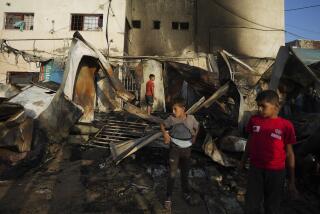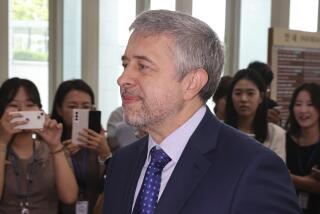Red Cross Sends Aid to N. Korea; U.S., Seoul Talks Stall
SEOUL — As the South Korean Red Cross on Friday shipped blankets and noodles to famine-stricken North Korea, efforts to mount an international relief effort were stymied as negotiations in Honolulu ended without agreement.
A Red Cross spokesman said the aid shipment included 100,000 packs of instant noodles, 20,000 pairs of socks and 2,000 blankets.
“The shipment is the third in a series of aid provisions to the North,” he said, adding that the relief group planned to send further aid worth $126,600 this year.
The spokesman said the vessel was expected to arrive at the North Korean port of Nampo early today.
In Honolulu, two days of high-level talks failed to resolve differences between the United States and South Korea over their response to what some are calling imminent famine in the reclusive Communist state.
Assistant Secretary of State Winston Lord, who led the U.S. delegation to trilateral talks that also included Japanese officials, came into the meetings saying the United States was considering up to $2 million in additional humanitarian aid to North Korea, according to participants in the talks.
But South Korean officials remained unwilling to provide more aid, saying North Korea’s problems have been exaggerated and the government of ruler Kim Jong Il is funneling food aid to its million-strong army instead of to its hungry citizens.
The International Committee of the Red Cross says as many as 130,000 people may face starvation in the coming months, but few nations have stepped forward to help the world’s last Stalinist stronghold.
But U.S. and South Korean officials fear that a hungry North Korea is more dangerous than a well-fed one.
Some analysts say that desperate hunger, combined with anger over the outside world’s weak response, make North Korea more likely to resort to military aggression than at any time since the Korean War ended in 1953.
Washington favors approaching the prickly North Koreans with a carrot to keep them engaged with the outside world.
Seoul officials, however, tired of North Korea’s refusal to talk to them directly and irked at the cascade of slurs against them in North Korea’s official media, favor a harder line and refuse to give more aid.
North Korea is struggling with food shortages caused by a failing economy and made worse by heavy flooding last summer.
Pyongyang says the floods did $15 billion worth of damage and left 600,000 people homeless. But the extent of flood damage and whether North Korea faces famine remain largely matters of speculation.
*
Dire assessments from the United Nations and the Red Cross have been based largely on information supplied by North Korea’s Communist leaders, and there are suspicions that they may be inflated.
The international response has been weak because of North Korea’s quirky and often belligerent government. The United States has provided only $225,000, which Lord described as “modest.”
Japan has provided $500,000 and 500,000 tons of surplus rice, but Prime Minister Ryutaro Hashimoto this week said he has no immediate plans to offer more.
South Korea provided 150,000 tons of rice last year but stopped all government aid after the volatile North Koreans forced one of its ships to fly a North Korean flag while unloading and arrested two crewmen for spying when they took a few photos. And many in Seoul fear the food is ending up in military caches.
More to Read
Sign up for Essential California
The most important California stories and recommendations in your inbox every morning.
You may occasionally receive promotional content from the Los Angeles Times.










